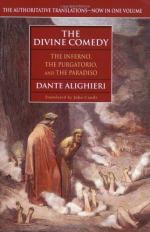Appear’d not) lo! a spirit turn’d his eyes
In their deep-sunken cell, and fasten’d then
On me, then cried with vehemence aloud:
“What grace is this vouchsaf’d me?” By his looks
I ne’er had recogniz’d him: but the voice
Brought to my knowledge what his cheer conceal’d.
Remembrance of his alter’d lineaments
Was kindled from that spark; and I agniz’d
The visage of Forese. “Ah! respect
This wan and leprous wither’d skin,” thus he
Suppliant implor’d, “this macerated flesh.
Speak to me truly of thyself. And who
Are those twain spirits, that escort thee there?
Be it not said thou Scorn’st to talk with me.”
“That face of thine,” I answer’d
him, “which dead
I once bewail’d, disposes me not less
For weeping, when I see It thus transform’d.
Say then, by Heav’n, what blasts ye thus?
The whilst
I wonder, ask not Speech from me: unapt
Is he to speak, whom other will employs.”
He thus: “The water and tee plant we pass’d,
Virtue possesses, by th’ eternal will
Infus’d, the which so pines me. Every
spirit,
Whose song bewails his gluttony indulg’d
Too grossly, here in hunger and in thirst
Is purified. The odour, which the fruit,
And spray, that showers upon the verdure, breathe,
Inflames us with desire to feed and drink.
Nor once alone encompassing our route
We come to add fresh fuel to the pain:
Pain, said Iolace rather: for that will
To the tree leads us, by which Christ was led
To call Elias, joyful when he paid
Our ransom from his vein.” I answering
thus:
“Forese! from that day, in which the world
For better life thou changedst, not five years
Have circled. If the power of sinning more
Were first concluded in thee, ere thou knew’st
That kindly grief, which re-espouses us
To God, how hither art thou come so soon?
I thought to find thee lower, there, where time
Is recompense for time.” He straight replied:
“To drink up the sweet wormwood of affliction
I have been brought thus early by the tears
Stream’d down my Nella’s cheeks.
Her prayers devout,
Her sighs have drawn me from the coast, where oft
Expectance lingers, and have set me free
From th’ other circles. In the sight of
God
So much the dearer is my widow priz’d,
She whom I lov’d so fondly, as she ranks
More singly eminent for virtuous deeds.
The tract most barb’rous of Sardinia’s
isle,
Hath dames more chaste and modester by far
Than that wherein I left her. O sweet brother!
What wouldst thou have me say? A time to come
Stands full within my view, to which this hour
Shall not be counted of an ancient date,
When from the pulpit shall be loudly warn’d
Th’ unblushing dames of Florence, lest they
bare
Unkerchief’d bosoms to the common gaze.
What savage women hath the world e’er seen,




